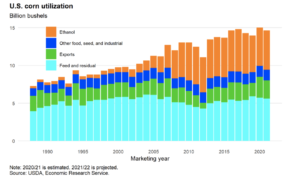House Agriculture Chair G.T. Thompson has tentatively scheduled a farm bill markup for the week of Feb. 23, according to three people familiar with the plans.
EPA to Propose Biofuel Blending Mandates for 2021 to Below 2020 Levels, Sources Say
Late last week, Reuters writers Stephanie Kelly and Jarrett Renshaw reported that, “The U.S. Environmental Protection Agency is expected to recommend to the White House reducing federal biofuel blending mandates for 2021 to below 2020 levels in what would be a blow to the biofuels industry, two sources familiar with the matter said on Friday.
“The EPA also is expected to make a separate recommendation to boost the blending mandates for 2022 above the previous two years, according to the sources, who spoke on condition of anonymity.
In the short term, the agency is looking to lower the amount of biofuels that refiners are required to blend into the U.S. fuel pool because the COVID-19 pandemic has sapped fuel demand.
“The move could be a risk for President Joe Biden’s administration, as some could view it as favoring oil refiners over the lower-carbon biofuels industry even as the administration presses companies to reduce emissions.”
2020 targeted levels or levels realized in 2020 given the standard is converted to a percent and thus volumetrically fell as gasoline demand fell in 2020…..
— Seth Meyer (@SethMeyerMU) August 20, 2021
The Reuters article explained that, “Under the U.S. Renewable Fuel Standard, oil refiners must blend billions of gallons of biofuels into the fuel mix, or buy tradable credits, known as RINs, from those that do. Refiners can also apply for exemptions to the mandates if they can prove the obligations would do them financial harm.”
“Biofuel producers rely on the national blending mandate to get their products into the U.S. fuel market. Cutting the mandate would hurt their market share. The mandates are intended to reduce U.S. reliance on imported oil,” the Reuters article said.
Also last week, Bloomberg writer Jennifer A Dlouhy reported that, “The Environmental Protection Agency is set to send a draft of biofuel-blending quotas to the White House for review as soon as Friday afternoon, marking a key step in the Biden administration’s bid to balance competing oil and agricultural interests.
“EPA officials have advised lawmakers and industry stakeholders that White House review of the plan is imminent, setting the stage for the agency to formally propose how much renewable fuel must be mixed into gasoline and diesel in 2021 and 2022 within weeks, according to people familiar with the matter. The people asked not to be named discussing the deliberations.
“Some lawmakers have been told to expect relatively unchanged requirements — and even a slight reduction is possible — which could be a blow to producers of corn-based ethanol and soy-based biodiesel, according to one of the people.”
The Bloomberg article added that, “The Biden administration is wrestling with several pressing biofuel policy questions, after federal courts ruled the EPA has wide latitude to exempt small refineries from the annual blending requirements and tossed out a Trump-era rule designed to boost summertime sales of higher-ethanol gasoline.”
DTN Ag Policy Editor Chris Clayton reported on Friday that, “The reports on EPA’s move come just a day after USDA announced a $26 million investment to build out biofuel infrastructure with grants in 23 states. The funding under the Higher Blends Infrastructure Incentive Program will go towards dozens of projects to help replace old fuel dispensers and storage tanks with blender pumps and tanks that can be used for both E15 and E85, as well as biodiesel. USDA stated the grants would increase potential biofuel sales by as much as 822 million gallons annually. USDA championed its funding announcement as a way to achieve Biden’s goals to reduce emissions.”
Meanwhile, Reuters writer Julie Ingwersen reported on Friday that, “Benchmark December soyoil settled down 3.27 cents at 56.65 cents per pound, paring losses after falling its daily 3.5-cent maximum. CBOT December corn ended down 13-3/4 cents at $5.37 a bushel after hitting $5.32-1/2, its lowest since July 26.
“Soyoil is the main U.S. feed stock for biodiesel fuel and corn is used for ethanol. The EPA is expected to recommend to the White House reducing federal biofuel blending mandates for 2021 to below 2020 levels, two sources familiar with the matter said on Friday, in what would be a blow to the biofuels industry.

“The EPA also is expected to make a separate recommendation to boost the blending mandates for 2022 above the previous two years, according to the sources.”





